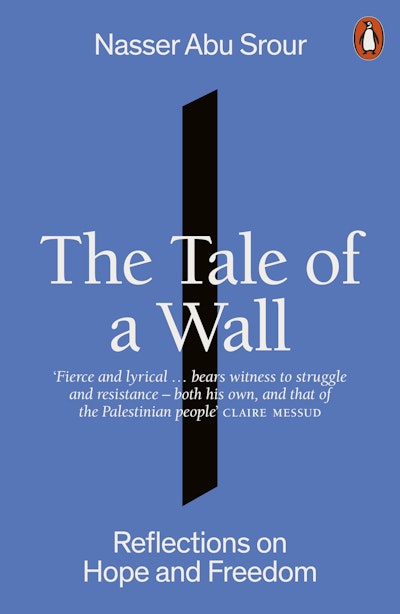- Published: 29 July 2025
- ISBN: 9781802066432
- Imprint: Penguin Press
- Format: Paperback
- Pages: 320
- RRP: $26.99
The Tale of a Wall
Reflections on Hope and Freedom
- Published: 29 July 2025
- ISBN: 9781802066432
- Imprint: Penguin Press
- Format: Paperback
- Pages: 320
- RRP: $26.99
Nasser Abu Srour doesn’t allow his long incarceration in an Israeli prison to break his spirit. He turns to the wall of his cell that is intended to confine him into his path to freedom, and in the process, out of the darkness of his cell produces a luminous memoir
Raja Shehadeh, author of We Could Have Been Friends, My Father and I: A Palestinian Memoir
In contemplating the meaning of freedom, and the prison walls enclosing him, Nasser Abu Srour has produced a richly emotional and affecting memoir. His poetic prose, lyrically translated by Luke Leafgren, ranges far beyond physical confines to evoke steadfastness and universal human dignity, through the intellectual curiosity of a writer ‘born into a family on the margins, living in a marginal place filled with marginal people.’ Its resonance, and Abu Srour’s vision, are far from marginal
Matthew Teller, author of Nine Quarters of Jerusalem
An extraordinary memoir. Abu Srour is not just a witness of his personal life but a witness to one of the major tragedies of our times
Amara Lakhous, author of Clash of Civilizations Over an Elevator in Piazza Vittorio
A unique, lyrical exploration of what his inhumane confinement has taught him about resistance, love, lies, forgiveness, and the complicated struggle for liberation of his fractured, occupied land. Rather than allow the many walls surrounding him from childhood to break him down, he has turned them into darkly luminous companions on a journey into the heart of cruelty and redemption
Ariel Dorfman, author of The Suicide Museum
A stunning book. A poetic and remarkable account of decades of imprisonment and the effect it can have on the mind, body and soul. This is a story of unimaginable loss, but also of survival
Sally Hayden
The Tale of a Wall is the reason we have literature. Nasser has made art out of poison with his honesty and golden pen. He brings to light the specificity of experience of the Palestinian prisoner in a manner that makes every reader think about the incarcerated in their own countries without forgetting Palestine. It helps us understand the consequences on others when we do not wield whatever power we each hold for solidarity. A profound and important work
Sarah Schulman
Abu Srour's memoir is more than a tale of prison. His unflinching prose reveals a powerful truth: human beings are compelled to tell our stories in order to affirm our existence in an unjust world. Ultimately he captures both the individual and collective spirit of Palestinians who, to this day, continue to resist dispossession, disillusionment, and despair
Sahar Mustafah
Here, at a historical moment when Palestinian prisoners are again discussed only as a collective political lever, Nasser Abu Srour writes from Hadarim Prison about love, endurance, loyalty, and freedom. His voice rises above the wall of his desert cell, above his confession-under-torture and thirty years in the Israeli penal system, above his life sentence and Israel’s broken promise to release him during the Obama-era peace negotiations. Fierce, lyrical, and defiantly beautiful, his testimony is full of generosity and white-hot courage. He turns his imprisoning wall into an instrument of his soul’s freedom. For the reader, that wall becomes a mirror: an instrument of empathy and conscience. You will come away with a heart full of resolve—to work for solidarity, justice, and mercy
Sarah Cypher
Fierce and lyrical, Nasser Abu Srour’s memoir bears witness to struggle and resilience—both his own, and that of the Palestinian people. It’s also a devastating testament to the power of hope, and of its loss
Claire Messud
It is rare to come across a book with such astonishing generosity and clarity. The Tale of a Wall is beautiful for its ability to examine the harsh realities of oppression with lush prose that creates its own uncompromising terrain. Nasser Abu Srour’s story, which he wrote while condemned to a lifetime sentence in an Israeli prison, is further proof that no wall can restrain the imagination, no bullet can kill the idea of freedom
Maaza Mengiste
The Tale of a Wall charts a deeply personal journey through the conflict that has defined Nasser Abu Srour’s life… extraordinary… his humanity shines through, even as he endures an incarceration with no end in sight… his poetic sensibility brings freshness to the telling of the well-rehearsed story of this long-running conflict: we see it anew
Lydia Wilson, Guardian
Nasser Abu Srour fights for everybody's freedom… thoughtful and honest… The personal and political are tightly entwined… brave… reveals that perhaps love can offer a certain kind of liberation too: a means to rise above the past, the present and possibly the future
Samir El-Youssef, The Times Literary Supplement
For me this is the strongest thing I’ve read about the heartbreak and relentless courage that is Palestine. A young man is sentenced to prison in an almost Kafka-like way, a story without details. But we become familiar with how he endures even finding love and passion (with a visitor to the prison) from his cell. The intimacy of it all, even the way the interior of his struggle transforms in time is robust and politically astute. I extracted from his marvellous telling that love honours all that is not killing in the world. It is a rough and hands down beautiful book
Eileen Myles



